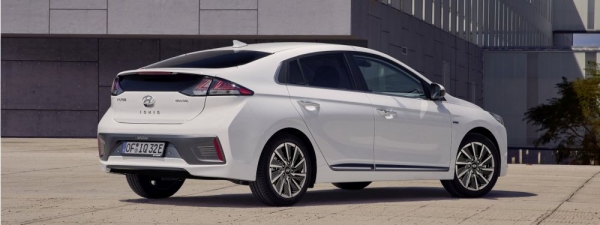
28.6.2019. The Hyundai Ioniq, electric wins at the readers of the Auto Zeitung for the coveted e-Mobility Award in the class “electric-Compact/sedans”.
And 16 international competitors, including the VW e-Golf and the BMW i3 refers to the places!
Eco-friendly vehicles of the car buyers focus on. Particularly high interest in the models with Hybrid or fully electric drive. Therefore, it is allowed to compete from the Green mobility Award at the prestigious Auto Zeitung, starting in 2019, the e-Mobility Award, in Hybrid and pure electric vehicles.
The Hyundai Ioniq, electric, (the Facelift model has not yet been approved for the German market Homo. The Homologation is carried out in the framework of the market introduction. Power consumption in kWh/100 km combined in the NEDC for the Vorfacelift model: 11,5; fuel consumption in l/100 km combined: 0,0; CO2 emissions in g/km combined: 0) is thus one of the first winners.
“This award demonstrates the pioneering spirit of our brand. Hyundai has already begun at an early stage, to develop electric vehicles with an attractive Design and at a competitive price and offer them to its customers. With the Hyundai Ioniq, electric, Kona electric, and the Nexo Hyundai already offers three purely electric-powered vehicles.“
Holger Müller
Director Of Sales, Hyundai Motor Germany
Hyundai Ioniq extensively revised
Hyundai has developed the Ioniq from the beginning, for the use of alternative drives and offers the compact sedan as Ioniq, electric, Ioniq Hybrid and Ioniq Plug-in Hybrid. The model year of 2020 (now available) drives up with numerous innovations. The Ioniq electric benefits: Due to the larger battery (38 instead of 28 kWh) and more power (100 instead of 88 kW) increase range (around 294 km in the WLTP, plus 36 percent) and driving pleasure. For fast load times of the standard built-in On-Board Charger provides you with now 7.2 kW. In addition, Hyundai has refined the Design of the Ioniq and the smart sense technology package with additional safety and comfort functions, advanced.
Premium for electric cars extended
Even more, to encourage people to purchase electric cars, has extended the Federal government’s environmental bonus for the promotion of electric mobility. Originally, the funding measure what is due to expire at the end of June 2019. Now, however, buyers of the Hyundai Ioniq, electric, a Hyundai Kona electric and Hyundai Nexo can request and expected to be completed by the end of 2020 4,000 Euro funding. 2,000 euros will be subsidised by the Federal government, the other half of Hyundai. The Hyundai Ioniq Plug-in Hybrid, the funding amounts to a total of 3,000 euros.
Fuel consumption and emission figures
The Facelift models of the Hyundai Ioniq, electric, Ioniq Hybrid and Plug-in Hybrid have not yet been approved for the German market Homo. The Homologation is carried out in the framework of the market introduction. Below are the fuel consumption figures for the Vorfacelift models:
Fuel consumption in l/100 km combined for the Hyundai Ioniq Plug-in Hybrid: 1.1 in; power consumption in kWh/100 km combined: 10.3; CO2 emissions in g/km combined: 26; CO2 efficiency class: A+.
Fuel consumption in l/100 km for the Hyundai Ioniq Hybrid: urban 3,8, extra-urban 4,5, combined to 4.2; CO2 emissions in g/km combined: 97; CO2 efficiency class: A+.
Fuel consumption in kWh/100 km combined for the Hyundai Kona electric: 15,4-15,0; CO2 emissions in g/km combined: 0; CO2 efficiency class: A+.
Fuel consumption (hydrogen) in kg H2/100 km for the Hyundai Nexo: urban 0,77, extra-urban 0,89, combined: 0,84. CO2-emission in g/km combined: 0. CO2-efficiency class: A+.
The stated fuel consumption and CO2 emission values were determined in accordance with the prescribed WLTP-method of measurement and in the NEDC-values converted.
Power consumption in kWh/100 km combined in the NEDC for the Hyundai Ioniq, electric: 11,5; fuel consumption in l/100 km combined: 0,0; CO2 emissions in g/km combined: 0; CO2 efficiency class: A+.


Hyundai Ioniq, Electric (Photo: Hyundai)